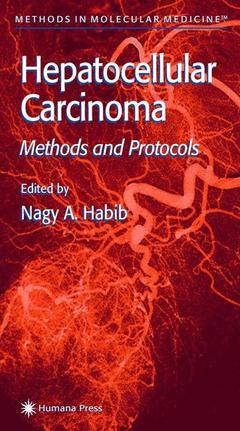Hepatocellular Carcinoma, Softcover reprint of the original 1st ed. 2000 Methods and Protocols Methods in Molecular Medicine Series, Vol. 45
Langue : Anglais
Coordonnateur : Habib Nagy A.

Hepatocellular Carcinoma: Methods and Protocols outlines the research methods applied in the laboratories and clinics of those scientists and cli- cians interested in the understanding and clinical management of patients with hepatocellular carcinoma (HCC). Part I, The Clinical Problem, has been contributed by two leading cli- cal groups who have identified and addressed problem areas related to the management of HCC patients. Various treatment modalities are discussed and emphasis is placed on the limitations they experienced. Part II, HCC Carcinogenesis, reviews the main etiological factors related to hepatitis B and hepatitis C. Part III, Molecular and Biological Characteristics, provides insight into the molecular changes associated with HCC, including tumor-suppressor genes, oncogenes, adhesion molecules, matrix metalloproteinase, and novel genes and markers. Part IV, HCC Gene Therapy, addresses gene therapy approaches to treating hepatocellular carcinoma. It includes the use of various vectors, such as lipids, viruses such as adenoviruses and baculoviruses, and virus detection using el- tron microscopy assessment. The use of adenovirus with specific promotors, such as AFP, is also included. Preclinical and clinical data on the killing of cancer cells using tumor-suppressor genes, antisense to growth factors, immunogene therapy, or virus-directed enzyme prodrug therapy are addressed.
The Clinical Problem.- Hepatocellular Carcinoma.- Medical Management of Hepatocellular Carcinoma.- HCC Carcinogenesis.- Possible Involvement of the NS3 Protein of Hepatitis C Virus in Hepatocarcinogenesis.- Abrogation of p53-Induced Apoptosis by the Hepatitis B Virus X Gene.- Hepatocellular Carcinoma.- Molecular and Biological Characteristics.- The Impact of Hepatitis B Virus (HBV) and Hepatitis C Virus (HCV).- Mutation of p53 Tumor Suppressor Gene in Hepatocellular Carcinoma.- Diagnostic Markers in Hepatocellular Carcinoma Using Immunohistochemical Techniques.- Assessing Matrix Metalloproteinase Expression and Activity in Hepatocellular Carcinomas.- Isolation of Novel Markers for Hepatocellular Carcinoma by a Subtraction-Enhanced Display Technique.- Measurement of Protein Expression of p53, p21WAF1, and Rb in Patients with Surgically Treated Hepatocellular Carcinoma by Using Catalyzed Signal-Amplification System.- HCC Gene Therapy.- Gene Therapy Vectors Harboring AFP Regulatory Sequences.- Advantages and Disadvantages of Multiple Different Methods of Adenoviral Vector Construction.- Electron Microscopic Assessment of Adenovirus-Mediated Transfer.- p53 Plasmid Preparation and Techniques for Analysis of Gene Transfer and Expression.- Antisense IGF-I for Hepatocellular Carcinoma.- Novel Effective Tumor Vaccines for Hepatocellular Carcinoma.- Immunoglobulin Fusion Proteins as a Tool for Evaluation of T-Cell Costimulatory Molecules.- Adenovirus-Mediated Drug-Sensitivity Gene Therapy for Hepatocellular Carcinoma.- Clinical Protocol for P53 Gene Therapy for Liver Tumors.- Clinical Protocol for p53 Gene Therapy for Liver Tumors.
Includes supplementary material: sn.pub/extras
Date de parution : 08-2013
Ouvrage de 302 p.
15.2x22.9 cm
Date de parution : 05-2000
Ouvrage de 302 p.
15.5x23.5 cm
Thème de Hepatocellular Carcinoma :
© 2024 LAVOISIER S.A.S.



